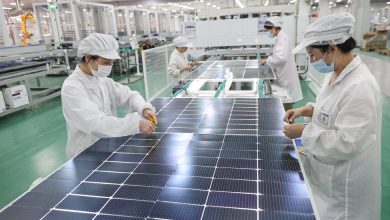Tightening the Squeeze on Russia


Protesters in Belgium.Credit…Ksenia Kuleshova for The New York Times
An oil embargo on Russia will take time to bite
Late last night, the European Union agreed to ban Russian oil imports arriving by sea by the end of the year. The agreement, which was reached after weeks of wrangling among E.U. member states, could cut into Moscow’s ability to finance its invasion of Ukraine. The embargo applies to most oil imports from Russia.
The key word in the sanctions package is “most,” Geordie Wilkes, the head of research at Sucden Financial, told DealBook. “There’s no doubt that the whole sanctions package and this latest move from the E.U. will hurt Russia,”he said. How much it hurts will depend on Russia’s ability to find other buyers — and how much “most” turns out to be, Wilkes said. The deal includes a temporary exemption for oil via pipelines.
The embargo could drive already high oil prices even higher. That’s because it will put a further strain on inventories, which are already low and are likely to stay that way, given China’s expected easing of coronavirus lockdown measures and summertime demand for more power for air-conditioners, Wilkes said. The push for cleaner energy has meant that companies have not been investing in new equipment to bolster production, and this could further hurt supplies in the longer term, he said. Futures for Brent crude, the global benchmark, rose to a two-month high of around $120 a barrel today.
In the short term, Russia will most likely have no problem continuing to find buyers for its oil. Buyers in India and China, the world’s biggest oil importer, are already snapping up Russian crude at bargain prices, and flows to these countries are likely to increase, analysts said. The damage of sanctions to Russia’s bottom line has been cushioned by persistently high oil prices.
Kpler, a firm that tracks petroleum shipping, estimates that Russian oil production actually edged up by about 200,000 barrels a day in May to 10.2 million barrels compared with April. Still, that was about 800,000 barrels below February’s daily levels.
Over time, the embargo will cost Russia billions of dollars a year. Russia’s energy industry is poised for a broad downturn once the restrictions kick in, and as major oil companies quit the country and sanctions curb imports of Western technology, The Times’s Stanley Reed writes.
Caroline Bain, the chief commodities economist at Capital Economics, told DealBook that while Russia would find other customers, “it’s going to be a disorderly process, and that will keep prices high in the near term.” She added: “We’re losing the most efficient supplier of oil to Europe at the moment.”
HERE’S WHAT’S HAPPENING
Shanghai is expected to ease Covid restrictions. Two months after China’s biggest city fell under a lockdown that rippled across the national economy, Shanghai is poised to return to something closer to normal starting tomorrow. The city released plans to reopen shops and malls and revive buses and ferries.
Unilever gives the activist investor Nelson Peltz a seat on its board. Peltz said today that Unilever had significant potential and that he was looking forward to working with its management. Peltz’s Trian Fund Management holds a 1.5 percent stake in the consumer goods group.
Senator Chuck Schumer tries to negotiate a compromise on new gun laws. President Biden on Sunday promised the families of the victims in the Texas shooting government action on gun violence, increasing pressure on the Senate. Schumer has raised expectations that a bipartisan deal on gun safety, mental health and school security is possible.
Danone will send the equivalent of about five million bottles of nondairy infant formula to the U.S. The shipment is part of a push to ensure that babies with allergies to cow’s milk and other proteins have enough to eat amid a nationwide shortage of formula. Nestlé’s C.E.O. said yesterday that no big shortages were expected outside the U.S.
New York City companies are opening offices where their workers live. To make the return to work more appealing, some companies have moved their offices out of Manhattan, easing employees’ commutes.
The candidate running against Elon Musk
Dan O’Dowd, a reclusive software billionaire, is running for Senate in California as a Democrat and will be on the ballot in next week’s primaries. But the person O’Dowd is really running against is not a candidate, or even a politician, Blake Hounshell writes in The Times’s On Politics newsletter.
All of O’Dowd’s campaign ads are focused on Elon Musk and his electric car company, Tesla, and most of them claim that the self-driving software that Tesla uses is unsafe. O’Dowd, who made his fortune building software for airplanes, says he has spent the past seven years trying to get regulators to take action against Tesla.
O’Dowd’s campaign is the latest instance of politics being used as a tool to influence business. Last year, the gun industry lobbied the Texas Legislature to pass a law that punishes banks for, as the law puts it, “discriminating” against firearm companies. Lawmakers have also used their power to punish companies, particularly financial ones, that are trying to divest from fossil fuels.
What’s different about O’Dowd’s campaign is that it doesn’t focus on a hot-button political issue. O’Dowd doesn’t even appear to want to win. Instead, one of the main reasons he appears to be in the race is to get a better rate on advertising. Federal regulations require broadcasters to provide steep discounts to qualified candidates for public office. But what O’Dowd is doing, experts say, appears to be allowed under election laws.
Musk is likely to be the focus of other politicians in the next election year. For Democrats, Musk may make for political pay dirt. Musk’s plan to buy Twitter, and potentially reinstate Donald Trump’s account, has raised Musk’s value as a political target. He has long been a talking point for progressives, like Senator Elizabeth Warren of Massachusetts, who say billionaires don’t pay their fair share in taxes. In turn, Musk has bashed Democrats and recently said that he would now “vote Republican.”
“I was out to dinner and the person said to me, ‘What do you think of Buffett’s investment?’ And I was like, ‘What?’”
— Shari Redstone, the chairwoman of Paramount, on how she learned this month that Warren Buffett’s Berkshire Hathaway had amassed a $2.6 billion stake in her company.
Rethinking Jack Welch
In his new book, David Gelles, a New York Times correspondent, examines corporate America through the evolution of General Electric and its leader, the business executive Jack Welch, from 1981 to 2001. The book, “The Man Who Broke Capitalism: How Jack Welch Gutted the Heartland and Crushed the Soul of Corporate America — and How to Undo His Legacy,” is out today. This interview with David has been edited and condensed.
The Russia-Ukraine War and the Global Economy
A far-reaching conflict. Russia’s invasion on Ukraine has had a ripple effect across the globe, adding to the stock market’s woes. The conflict has caused dizzying spikes in gas prices and product shortages, and is pushing Europe to reconsider its reliance on Russian energy sources.
Global growth slows. The fallout from the war has hobbled efforts by major economies to recover from the pandemic, injecting new uncertainty and undermining economic confidence around the world. In the United States, gross domestic product, adjusted for inflation, fell 0.4 percent in the first quarter of 2022.
Energy prices rise. Oil and gas prices, already up as a result of the pandemic, have continued to increase since the beginning of the conflict. The sharpening of the confrontation has also forced countries in Europe and elsewhere to rethink their reliance on Russian energy and seek alternative sources.
Russia’s economy faces slowdown. Though pro-Ukraine countries continue to adopt sanctions against the Kremlin in response to its aggression, the Russian economy has avoided a crippling collapse for now thanks to capital controls and interest rate increases. But Russia’s central bank chief warned that the country is likely to face a steep economic downturn as its inventory of imported goods and parts runs low.
Trade barriers go up. The invasion of Ukraine has also unleashed a wave of protectionism as governments, desperate to secure goods for their citizens amid shortages and rising prices, erect new barriers to stop exports. But the restrictions are making the products more expensive and even harder to come by.
Food supplies come under pressure. The war has driven up the cost of food in East Africa, a region that depends greatly on exports of wheat, soybeans and barley from Russia and Ukraine and is already dealing with a severe drought. Amid dwindling supplies, supermarkets around the world have begun asking customers to limit their purchases of sunflower oil, of which Ukraine is a top exporter.
Prices of essential metals soar. The price of palladium, used in automotive exhaust systems and mobile phones, has been soaring amid fears that Russia, the world’s largest exporter of the metal, could be cut off from global markets. The price of nickel, another key Russian export, has also been rising.
Do you think Welch got a pass during his lifetime?
Initially, he didn’t. Just a couple years after taking over G.E., he earned the nickname “Neutron Jack” after unleashing a series of mass layoffs that destabilized the American working class. What’s so remarkable is that he recovered from that — thanks largely to his ability to drive G.E.’s share price ever higher — and ended his career with Fortune magazine crowning him “manager of the century.”
In the excerpt from your book in The Times, you suggested that Welch’s leadership style led to the rise of Elon Musk. Why? Who is better?
I see Musk as the inheritor of Welch’s legacy as a brash, impulsive C.E.O. operating with a sense of impunity. But when it comes to their actual track records as businessmen, there’s a world of difference between the two men. Perhaps most importantly, Welch was a manager, and made his name and fortune by acquiring companies, shuffling assets and doubling down on finance. Musk, for all his complexity, is ultimately a builder, having created two thriving companies in Tesla and SpaceX.
What do you think about Jack Welch’s legacy with female executives? He was criticized for not promoting them.
Our former colleague Mary Williams Walsh wrote what I think is the authoritative piece on this topic in 2000, just before Welch retired. The answer is: It wasn’t great. While the ’80s and ’90s were, of course, a different era, there is no doubt that as many more women assumed senior roles at big companies around the country, there were conspicuously few women in senior roles at G.E.
Do you think Welch’s influence on the business world will be reversed?
We can’t change history, and we can’t change the last 40 years of capitalism in America. What we can do is chart a new path forward. It’s important to remember the rise of Friedmanism, the rise of shareholder primacy, the rise of Welch and everything he stood for was a multigenerational project.
I believe we can have a more just economy. But it’s going to be a generational project, one that takes decades and decades. Company by company, executive by executive, union drive by union drive, at the warehouses of Amazon and the coffee shops of Starbucks, we can, piece by piece, create an economy that’s better for workers, better for communities and is better for the environment.
THE SPEED READ
Deals
-
GSK will buy the U.S. biotech company Affinivax for up to $3.3 billion. (Reuters)
-
Richard Li’s insurance company FWD has reportedly delayed its Hong Kong I.P.O. (FT)
-
Ripple and FTX, two top crypto companies, are on the lookout for acquisitions. (CNBC)
Policy
-
In an opinion piece, President Biden writes about his plan for fighting inflation. (WSJ)
-
Several states are putting more money and effort into combating false and misleading information about elections. (NYT)
-
“How a Florida Power Project Flew Under the Regulatory Radar” (NYT)
-
Deutsche Bank’s offices in Frankfurt were raided by the police, who are investigating accusations of “greenwashing.” (Bloomberg)
Best of the rest
-
Wall Street’s losing streak ends, but the concerns that drove the panic remain unresolved. (NYT)
-
The profits engine that drove stocks to their highs may be working in reverse. (NYT)
-
Ted Sarandos of Netflix talks about the stock market drop and backing Dave Chappelle. (NYT)
-
Goldman’s new unlimited vacation policy is less generous than it sounds. (NYT)
David F. Gallagher contributed to today’s DealBook.
Thanks for reading! We’ll see you tomorrow.
We’d like your feedback. Please email thoughts and suggestions to [email protected].
We’d like your feedback! Please email thoughts and suggestions to [email protected].




